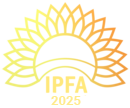Dear Colleagues,
This year, annual IPFA 2025 conference is devoted to the topic of Ecosystems Restoration
The conference will be held on the basis of College of Hospitality Industry Management, SUAN SUNANDHA RAJABHAT UNIVERSITY
Conference organizers:
— SUAN SUNANDHA RAJABHAT UNIVERSITY, Thailand
— Czech University of Life Sciences Prague, Czech Republic
In light of security concerns, the conference will be conducted online to ensure a high level of safety. This format will also allow for inclusive participation of scientists across different countries.
The primary objective of this conference is to engage in discussions and present initiatives regarding dryland agri-food systems. The focus will be on the integration of various aspects, from the farm household to the broader landscape, market, and ecosystems. The farm household plays a crucial role in sustainable food production, particularly in the face of uncertain climatic conditions. It is important to recognize that farmlands are vital ecosystems that sustain human life. These modified ecosystems, such as arable fields and pastures, hold both economic and spiritual significance.
However, certain practices like intensive ploughing, excessive fertilizer use, and cultivation techniques have led to the pollution of waterways and a decline in soil quality. Moreover, ecosystems in conflict-affected areas suffer from soil and water pollution, as well as direct damage caused by warfare. These damages often result in widespread fires, with large areas marked by craters from munitions and littered with military waste.
The IPFA 2025 conference seeks to develop comprehensive plans for sustainable land use, restore degraded land, promote sustainable livestock production methods, conserve and rehabilitate natural habitats.
IPFA 2025 welcomes paper submissions from scientists involved in restoration efforts in both terrestrial and aquatic ecosystems. Additionally, authorities, non-governmental organizations, research institutions, private companies, and students are encouraged to actively engage in the discussions at the conference.
We are welcoming all the works associated with but not limited to the following issues:
Advocating for the sustainable management of agricultural and the preservation of ecosystems, addressing the environmental repercussions of warfare, rehabilitating degraded lands, and studying the effects of military activities on the environment et al. More CALL FOR PAPER
